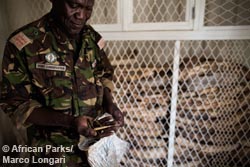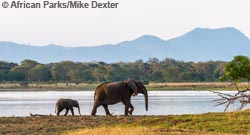
Thursday, March 3rd 2016 is World Wildlife Day. This year, the theme centers on protection of elephants in particular. Recognizing the links between wildlife trafficking and the perpetration of atrocities in central and eastern Africa, Enough is calling on U.S. Congress to pass critical anti-wildlife trafficking legislation – make your voice heard and take action here.
Editor’s Note: This post was written by Enough Project intern Ben Rissler.
With an alarming reduction in the elephant population from approximately 20,000 in the 1980’s to less than 2,000 in 2015, anti-poaching and anti-trafficking efforts are vital to saving the lives of Africa’s remaining elephants from extinction. The repercussions of the illicit ivory trade additionally extend into the human rights and humanitarian sector, funding in part the violent activities of deadly rebel groups
Armed militias, such as Joseph Kony’s Lord’s Resistance Army (LRA), are using the sale of ivory as a means to finance their terror and mass atrocities against civilians. Sasha Lezhnev, Enough Project Associate Director of Policy, has noted that elephant poaching is a “lifeline for survival” for the LRA. Today, the LRA is increasingly poaching elephants for valuable tusks, trading the ivory for ammunition, supplies, and food in the Darfur region, with the likely complicity of local Sudanese army officials. Poaching has a direct relationship with the militarization of the region, with a single tusk worth up to 17,500 rounds of bullets at local markets in central Africa. A 2015 Enough Project report, Tusk Wars: Inside the LRA and the Bloody Business of Ivory, elucidates the implications ivory trafficking has on profound human rights abuses.
Over the past 28 years, Joseph Kony’s militia has abducted more than 66,000 children and is responsible for more than 100,000 deaths. At the height of the conflict, around 2 million people were displaced, fleeing the brutality. Despite a reduction in the size of the LRA, Joseph Kony remains at large, and the rebel group has committed 250 attacks and abducted 844 civilians since January 2015, according to the LRA Crisis Tracker. The people of the Central African Republic, Democratic Republic of the Congo, and South Sudan are still imperiled and remain traumatized by decades of attacks and abductions.
 Park rangers in particular are risking their lives every day to protect wildlife and the spread of this illicit trade in the region. The Democratic Republic of the Congo’s Garamba National Park is a hotbed for elephant poaching, and poachers transport tusks from there to Central African Republic, South Sudan, and Sudan, where they are sold to middlemen that smuggle the ivory to consumer markets outside Africa.. In an exclusive interview regarding the troubling situation, Garamba park ranger Jean Claude Mambo notes that “there is definitely a clear connection between these poachers and their rebellions.” The rangers need more support to protect both the elephants and civilians residing in the areas surrounding Garamba National Park.
Park rangers in particular are risking their lives every day to protect wildlife and the spread of this illicit trade in the region. The Democratic Republic of the Congo’s Garamba National Park is a hotbed for elephant poaching, and poachers transport tusks from there to Central African Republic, South Sudan, and Sudan, where they are sold to middlemen that smuggle the ivory to consumer markets outside Africa.. In an exclusive interview regarding the troubling situation, Garamba park ranger Jean Claude Mambo notes that “there is definitely a clear connection between these poachers and their rebellions.” The rangers need more support to protect both the elephants and civilians residing in the areas surrounding Garamba National Park.
Given this humanitarian and conservation crisis, more action in service to safeguarding the elephant species from extinction is needed. Those efforts will also help cut off a key funding source to armed groups. Current legislation in Congress takes a stand against some of the worst human rights violators who have turned to the slaughter of elephants and the trafficking of ivory as a means to finance their killing and terror. Championed in the Senate by Senators Coons (D-DE) and Flake (R-AZ) and in the House by Congressmen Ed Royce (R-CA) and Eliot Engel (D-NY), the Global Anti-Poaching Act would help counter this source of funding for many armed groups by identifying countries of concern regarding the supply, poaching, or transit of wildlife and wildlife products, strengthening wildlife enforcement networks on-the-ground, and working to reduce demand for wildlife products such as ivory. The Enough Project urges the Senate to swiftly move forward this bipartisan legislation.
Tell Your Senators to Support Global Anti-Wildlife Trafficking Legislation: Take Action Now >

